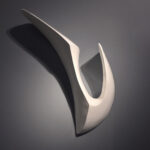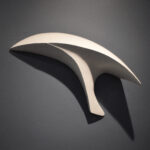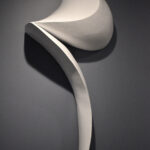Biography
To quote Plato “our need will be the real creator”. Traditionally for over two decades, Rudolph Serra has pursued his works in clay and terra cotta. When “COVID hit, and I couldn’t get clay”, necessity being the mother of invention culminates in a solo show of pure white three-dimensional sculptural forms and gestural drawings on paper titled, Curling, Swirling Contours in Space, at MARK BORGHI, Sag Harbor, July 1st through July 14th. By engaging with the material typically associated with crafting, carved surfboard foam finished with water-based fiberglass, Serra’s approach to art-making can be described as the transformation of unconventional materials into organic, animated forms whose movement is temporarily suspended in time. Although these pieces may appear to be rough, raw, and harsh, they are also calm, beautiful, and overflowing with details that are a delight to the eye.
“Growing up in San Francisco near the ocean, early impressions were made by the harsh weather’s impact on the long stretch of beach nearby. Always in flux, nature left its strong, calming, soothing imprint. The beach would change from a large, horizontal plane to high dunes, to deep tidal pools carved by the backwash of rip currents.” Serra also was influenced by “the sculptures of our neighbor two doors away Mark di Suvero and later those of my older brother Richard Serra. Their sculptures seemed to be built with a kind of dynamic, architectural presence. This offered a language for me to use to construct forms.”
Experimenting with shapes, lines, and volumes, Serra’s objects can be seen as three-dimensional drawings. Serra’s wall-mounted reliefs combine gestural folds, crevices, ravines, and gauges, which transform into a form of asemic writing— “writing that has no specific content,” Serra explains, “like a gesture. I just want the pure shapes: the perfect rock, the nice seashell. When you’re looking at it, asemic writing lets you get lost in your imagination, and I hope you have a nice journey there.” For that reason, Serra decided to leave the work gracefully unmarked. “I’m not giving directions; I’m providing a place to ponder, to find enjoyment,” he says. “When we choose to be an artist, we take the power to put something into the world: I want to put beauty there.”
Today, Rudolph Serra splits his time between his studio on Greene St in lower Manhattan, the quiet village of Sag Harbor, and wave riding in Montauk.

 ASEMIC 16
ASEMIC 16
 ASEMIC 9
ASEMIC 9
 ASEMIC 8
ASEMIC 8